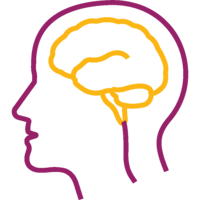
Monday, 2 September, 2024
The gut-brain connection is an intricate relationship between our digestive system and mental health. It is a two-way communication system that influences everything from mood and stress levels to our overall sense of well-being. Research has shown that a healthy gut can contribute to a healthy mind, while digestive issues can negatively impact mental health. This article delves into the mind and gut connection, how it works, and practical steps to improve it.
Understand What is the Gut-Brain Connection?
The brain stomach connection refers to the communication network linking the gastrointestinal (GI) system and the brain. This connection is facilitated by the gut-brain axis, a complex system of nerves, hormones, and chemicals that allow the gut and brain to send signals to each other. This axis influences various bodily functions, including digestion, mood regulation, and immune response.
How Does the Gut-Brain Connection Work?
The gut-brain axis functions through several pathways, involving the central nervous system (CNS), the enteric nervous system (ENS), the endocrine system, and the immune system. Here’s how it all works together:
1. Nervous System Communication:
The gut is often called the "second brain" because it contains a vast network of neurons known as the enteric nervous system (ENS). This system communicates directly with the central nervous system (CNS) through the vagus nerve, a major highway for transmitting signals between the gut and brain.
2. Chemical Signaling:
The gut produces neurotransmitters like serotonin, dopamine, and gamma-aminobutyric acid (GABA), which play a critical role in regulating mood and emotions. Interestingly, about 90% of the body's serotonin, a key mood stabilizer, is produced in the gut.
3. Immune System Interaction:
The gut houses a significant portion of the immune system, and any inflammation or infection in the gut can send stress signals to the brain, potentially leading to mood disorders like anxiety and depression.
4. Microbiome Influence:
The gut microbiome, a diverse community of trillions of microorganisms residing in the digestive tract, plays a crucial role in the gut-brain connection. These microbes produce metabolites that influence brain function, mood, and behavior. Disruption of the microbiome, known as dysbiosis, can contribute to mental health conditions.
Impact of Digestion on Mental Health Conditions
Gut-Brain Axis
Now let’s understand how does gut brain axis work? It is a bidirectional communication system that impacts both gut health and mental well-being. When the gut is healthy, it can send positive signals to the brain, promoting a stable mood and cognitive function. Conversely, poor gut health can lead to negative brain signals, contributing to mental health issues.
Chronic gastrointestinal conditions like irritable bowel syndrome (IBS) have been linked to anxiety and depression. This is because the gut sends stress signals to the brain when it's inflamed or irritated, triggering a cascade of emotional and psychological responses. For personalized advice and management of such conditions, consulting a gastroenterologist in Bangalore can provide targeted treatment and support.
Microbiome Influence
The gut microbiome plays a significant role in mental health. A balanced microbiome can promote a positive mood, while an imbalanced microbiome can contribute to mental health issues. Studies have shown that individuals with depression or anxiety often have different gut microbiomes compared to those without these conditions.
For instance, certain strains of bacteria, like Lactobacillus and Bifidobacterium, are known to produce short-chain fatty acids (SCFAs) that have anti-inflammatory properties. A deficiency in these bacteria can lead to increased inflammation and altered brain function, contributing to mood disorders.
Mood Fluctuations
The gut and brain connection is particularly evident in how digestion affects mood. When the gut is functioning well, it helps regulate mood by producing and releasing neurotransmitters like serotonin and dopamine. However, when digestion is impaired, it can lead to mood swings, irritability, and even feelings of hopelessness.
For example, bloating, constipation, or other digestive discomforts can cause physical and emotional distress, impacting one's mood and outlook on life.
Increased Stress Levels
Stress and gut health are closely interconnected. Chronic stress can disrupt digestive function, leading to issues such as bloating, diarrhea, or constipation. These digestive problems can, in turn, worsen stress levels, creating a vicious cycle. The gut-brain axis is crucial in this interaction, with stress hormones like cortisol influencing gut function and gut issues affecting stress responses. Understanding how stress affects the digestive system and the stress impact on gut health helps in managing both stress and digestive problems more effectively.
How to Improve Gut-Brain Connection?
Given the significant impact the gut has on mental health, improving the gut-brain connection is essential. Here are some strategies to promote a healthy gut and, in turn, a healthy mind:
Eat a Healthy Diet
A diet rich in fiber, fruits, vegetables, and whole grains supports a healthy gut microbiome and positively influences the gut-brain connection. Fermented foods such as yogurt, kefir, and sauerkraut introduce beneficial bacteria that enhance gut health and, in turn, support mental well-being. Additionally, reducing the intake of processed foods, sugar, and artificial additives helps prevent inflammation and maintains a balanced microbiome, reinforcing the gut-brain connection diet.
Get Regular Exercise
Physical activity is beneficial for both the body and mind. Regular exercise can improve gut motility, reduce stress levels, and promote the growth of healthy gut bacteria. Even moderate activities like walking, swimming, or yoga can have a positive impact on gut health and mental well-being.
Take Prebiotics and Probiotics
Prebiotics and probiotics are essential for maintaining a healthy gut. Prebiotics are non-digestible fibers that feed beneficial bacteria in the gut, while probiotics are live bacteria that can help balance the gut microbiome. Incorporating prebiotic-rich foods like bananas, garlic, and onions, along with probiotic-rich foods like yogurt and fermented vegetables, can improve gut health and the gut-brain connection.
Manage Stress
Stress management is crucial for maintaining a healthy gut-brain connection. Techniques like meditation, deep breathing exercises, and mindfulness are effective ways to manage stress and improve gut function. Additionally, getting adequate sleep and practicing relaxation techniques can further help manage stress and its impact on the gut. Understanding how to manage stress through these practices can promote both mental well-being and digestive health.
Conclusion
The gut-brain connection is a powerful reminder of how intertwined our physical and mental health truly are. By understanding and nurturing this connection, we can take proactive steps to improve both digestion and mental well-being. Whether it's through diet, exercise, or stress management, small changes can lead to significant improvements in overall health. A healthy gut fosters a healthy mind, paving the way for a more balanced and fulfilling life. Addressing mental health and stomach problems through these methods can further enhance your well-being and quality of life.For personalized advice and treatment, consider consulting a gastroenterology hospital in Bangalore.
FAQ’s
How do I fix my gut-brain connection?
To improve your gut-brain connection, focus on a healthy diet rich in prebiotics and probiotics, regular exercise, and stress management techniques.
Does gut health affect your mind?
Yes, gut health significantly impacts mental health through the gut-brain axis, influencing mood and stress levels.
Is there a relationship between the gut and the brain?
Absolutely, the gut-brain connection refers to the bidirectional communication between the gut and the brain, affecting both mental and digestive health.
How to heal an unhealthy gut?
To heal an unhealthy gut, adopt a gut-brain connection diet that includes fiber-rich foods, probiotics, and prebiotics, and manage stress effectively.
Author doctor name
Consultant - Medical Gastroenterologist
MBBS MD (Internal Medicine) DM (Medical Gastro)


 Neurosciences
Neurosciences Bariatric Surgery
Bariatric Surgery